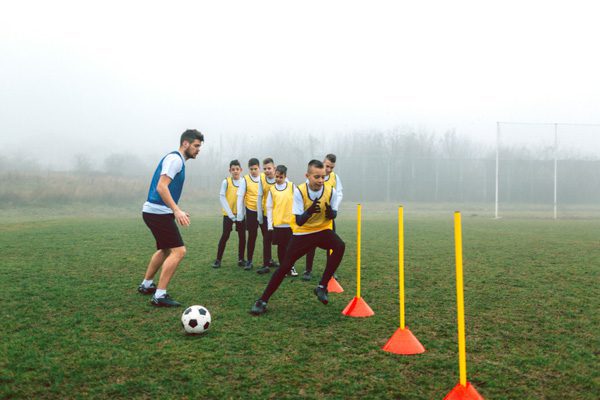Gettin’ Schooled with Grayson: Should I play at the next level?
Over the past ten weeks, Grayson Williams-Krebs has been an outstanding addition to the CoachUp family as a hard-working intern that knows the passion required to play sports after high school. Although she’s headed back to the West Coast for her senior year at the University of Puget Sound and the final preseason of her career, we realized that Grayson should continue her work with us outside of the office. T
hat’s why we’re launching a new series called Gettin’ Schooled with Grayson! Check back every other week as Grayson will detail her journey through collegiate sports, answer the tough questions, and help athletes that need inspiration along the way!
Question #1: How do I know if collegiate sports are right for me? How do I know if I’m ready for the next level?
For me, trying to play at the next level was never a question — it was only a matter of how I’d get there. In high school, I earned a varsity spot my freshman year on a team of fourteen seniors, many of whom went on to play collegiate soccer. I earned first-team All-League honors my sophomore, junior, and senior year and received first-team All-State and Player of the Year in my league.
I only tell you these details because of the criticisms I got when I chose a NCAA Division III program. “I thought you were serious about soccer” and “why didn’t you go Division I?” were questions I heard each and every day.
However, as I enter my senior season on the University of Puget Sound soccer team, I’m thankful I was able to extend my career for four more years at a place that challenged me to become a better athlete, student, and well-rounded person. Through reflection, I realize that the recruiting process is so much more than just finding the best sports school, in fact, it’s a course of action that you must approach holistically.
The college recruiting process is an extremely stressful and confusing time for high school athletes. These athletes are not entirely sure what they want and tend to be sucked into the hyper-competitive culture of sports. Often times, these kids are bombarded by emails from recruiters, given a school’s less-than-authentic presentation, and may get caught up in the so-called fame of a particular program.
So, in order to reach even just one athlete, we’ll be working through the full recruiting process from start to finish, delving into tough topics with the help of some of CoachUp’s most revered resources. Of course, before you can deal with recruiters or scholarships, I’d like to start off with the first question you must absolutely ask yourself: how do I know if I’m ready for the next level?
First of all, college sports are a huge commitment, regardless of the division — let’s get that straight right off the bat. My head coach always tells us that we’re 24-hour athletes, meaning we don’t get to do what other college students are doing. You’ll always have two hour practices, film sessions, training, lifting, traveling, meetings, and all of that’s on top of our school work. You will, inevitably, have a different college experience than your peers who are not involved in varsity sports, unfortunately, that is something that you have to come to terms with.
College sports push you to limits you never thought you could reach, but there will be moments when you feel like you can’t do it anymore. There will be sacrifices along the way, but if you truly love not only your sport, but your team as well, then the reward of being a student-athlete will make it all worth it. Bonding, traveling, friendships, and discipline are all unique to the student-athlete experience, giving you a valuable perspective for life after sports.
So while you lose the freedom of your schedule, late weekend nights, and the opportunity to procrastinate, you gain a new kind of support system.
You just have to ask yourself, what do you want out of the next four years?
At CoachUp, we strongly believe that coaches can be great mentors and, therefore, it’s important to fully utilize their assistance. Your high school and club coaches know you best as an athlete and can give you an honest evaluation of where you stand within the recruiting process. Chances are high that these coaches have had other players go on to play in college or they’ve competed there themselves. Now is a time to seek impartial, unbiased feedback — being lied to at this point in the process will only hurt your chances.
Finally, there’s no harm in contacting college coaches with your achievements and a highlight reel to see if you get interest from them. College coaches are, generally, very honest if they believe you fit within their program. You can also attend ID camps and get feedback from coaches that have you seen you play in a college-like environment. ID camps offer a way to compare yourself to other high school athletes that are trying to get to their next best level.
Not only is it important to ask these questions in the preliminary recruiting process, it’s also crucial to periodically ask yourself these questions throughout the process — even after you commit or finish a season. Our passions change all the time and that is completely normal! Just remember to stay true to yourself and understand that the decision you make is a huge one, so it takes constant evaluation and time.
As you approach the recruiting process, take time to reflect and figure out what you want because nobody else — not a coach, recruiter, parent, or friend — can.
Until next time,
GWK
Extra Time Insight From CoachUp Coaches

“I’ve always loved soccer and didn’t feel burnt out after high school, so decided I would try out for the college team. Obviously, I didn’t understand the recruiting process, but I made my own way there. I ended up getting injured the day after my high school graduation, keeping me out from training all summer.
I still contacted the coach for a walk-on tryout and gave it my best shot during preseason, but I was nowhere near the needed fitness level and couldn’t keep up with their speed of play. That semester, I enrolled in a soccer course to get touches on the ball, all in hopes of training with the team the following off-season. Through hard work and dedication, I was invited to join and eventually worked my way into the starting lineup about halfway through the year. The goal of playing in college was always in front of me, I just had to decide that it was truly what I wanted. It was, so I went and made it possible.”
— Scott Hayes, Biola University
“For me, it took not being recruited and being cut my freshman year of college to realize that it’s what I really wanted to pursue. In all likelihood, I could’ve played D1 or D2 football, but it wasn’t what I was passionate about — no, I wanted to play basketball. Being cut was a humbling experience, to say the least. I’d never been cut before and it lit a fire under me.
I worked out all season while they were playing and, as soon as the season ended, I was in the coach’s office to learn about what I needed to do to make the team. I spoke mostly with close friends and family about my desire to play and they all knew that I could do it if I really wanted to. Having their support mixed with being overlooked gave me all the inspiration I needed.”
— Zach Stevenson, De Anza College
How useful was this post?
Click on a star to rate it!
Average rating 0 / 5. Vote count: 0
No votes so far! Be the first to rate this post.



